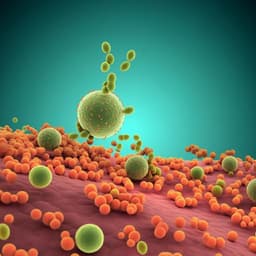
Medicine and Health
Perturbation of the gut microbiome by *Prevotella* spp. enhances host susceptibility to mucosal inflammation
A. Iljazovic, U. Roy, et al.
This groundbreaking study reveals how colonization of mice with Prevotella intestinalis worsens intestinal inflammation by modifying the gut microbiome and reducing vital short-chain fatty acids. Notably, IL-18 levels drop significantly, leading to increased inflammation. However, supplementation with IL-18 shows promise in mitigating this response. These insights from Aida Iljazovic and colleagues could reshape our understanding of metabolic shifts in gut health.
~3 min • Beginner • English
Introduction
Intestinal homeostasis reflects interactions between the microbiota and host immunity, where microbial metabolites influence epithelial barrier function and mucosal immune responses. Dysbiosis, including reduced microbial diversity and altered short-chain fatty acid (SCFA) production, has been associated with inflammatory bowel disease (IBD) and rheumatoid arthritis (RA). Associations with specific bacteria (e.g., Enterobacteriaceae such as adherent-invasive E. coli, Klebsiella pneumoniae, Proteus mirabilis) and other microbes (Akkermansia, Bacteroides, Helicobacter, protozoa, phages) have been implicated in colitis models. Members of the genus Prevotella are common in plant-rich diets and have been associated with both beneficial and deleterious host effects, including links to RA and colitis in mouse models. However, causality and mechanisms are unclear due to strain diversity and lack of murine intestinal Prevotella isolates. The study aims to isolate a novel intestinal Prevotella species from colitogenic microbiota and determine whether its colonization causally exacerbates mucosal inflammation, defining underlying ecosystem and metabolic changes and their impact on IL-18 and colitis susceptibility.
Literature Review
Previous human and animal studies link microbiota alterations to IBD and RA, noting increased Gammaproteobacteria and Enterobacteriaceae (e.g., AIEC) in IBD, which can modulate colitis in mice. Other commensals (Akkermansia muciniphila, Bacteroides spp., Helicobacter spp.) and non-bacterial members (Tritrichomonas muris, Caudovirales phages) affect inflammation. Prevotella spp. show context-dependent associations: beneficial correlations with plant-rich diets and improved glucose metabolism, but also associations with autoimmune diseases, insulin resistance, diabetes, and gut inflammation. Prevotella copri is enriched in new-onset RA and preclinical autoimmunity. In mice, NLRP6-deficient lines with Prevotella-rich microbiota show increased DSS colitis susceptibility and high IgA coating of Prevotella, suggesting immunogenicity. These mixed observations underscore uncertain causality, potential community-mediated effects, and the need for mechanistic studies using murine isolates.
Methodology
Isolation and taxonomy: Novel Prevotella spp. were isolated under anaerobic conditions from colonic content of colitogenic Nlrp6−/− mice using step-wise enrichment, vancomycin selection, and BHI-S blood agar plating. 16S rRNA gene analysis identified three novel species; one isolate from Nlrp6−/− mice was designated Prevotella intestinalis (OTU_16). Mining the integrated mouse gut metagenome catalog (iMGMC) confirmed presence of P. intestinalis in laboratory and wild mice.
Colonization experiments: Specific pathogen-free (SPF) C57BL/6N mice devoid of Prevotella were colonized by single oral gavage with 3 × 10^8 CFU P. intestinalis; in some experiments SPF2 mice from Taconic were colonized. Additional colonizations used Prevotella rodentium (new isolate) or Duncaniella muris (Muribaculaceae). Colonization lasted 4–5 weeks before analyses. For some SPF2 mice rectal administration followed oral gavage.
Microbiota profiling: Fecal and mucosa-associated communities were profiled by 16S rRNA gene sequencing. β-diversity was analyzed via PCoA (Bray–Curtis) and ADONIS; differential taxa by LEfSe. Bacterial loads were quantified by flow cytometry. Firmicutes/Bacteroidetes ratio and α-diversity (Shannon) were assessed.
Colitis model and clinical assessment: Acute DSS colitis was induced (SPF: 2.1% w/v DSS; SPF2: 1.6% w/v) for 7 days followed by water. Body weight, colonoscopy scoring (days 6 and 9), colon length, and histopathology (H&E; composite and parameter-wise scoring) were recorded. Survival monitored.
Cytokine and chemokine measurements: Distal colon tissue homogenates were analyzed at steady state (d0) and day 7 DSS using LEGENDplex multiplex assays and ELISA (IL-18). Chemokines (e.g., LIX/CXCL5, MCP-1/CCL2, MIP-1α/CCL3, MIP-1β/CCL4) were quantified.
Immune cell phenotyping: Colonic lamina propria leukocytes were isolated and analyzed by flow cytometry for CD45+ cells, CD4+, CD8+, activated CD4+ (CD62L−CD44+), Th1 (CD4+IFN-γ+), Th17 (CD4+IL-17A+), Tregs (CD4+Foxp3+), neutrophils (Ly6C+Ly6G+), infiltrating monocytes, dendritic cells, and resident macrophages. Rag2−/− mice were used to assess dependence on adaptive immunity.
Metabolomics and SCFA analyses: Targeted metabolomics of cecal content measured taurine, histamine, and polyamines (putrescine, spermidine, spermine, cadaverine) by GC–MS (SIM mode). SCFAs (acetate, propionate, butyrate) were quantified in cecum, colon, and serum 4 weeks post-colonization by GC–MS. Stable isotope tracing used oral gavage of 50 mg 13C-labeled acetate; 13C enrichment in acetate and butyrate was quantified after 4 h. In vitro fermentation profiles of P. intestinalis and Parabacteroides goldsteinii were measured in BHI-S at OD600 ≈ 0.45 for acetate, propionate, butyrate, succinate, formate.
IL-18 supplementation: Recombinant IL-18 (200 ng, i.p.) or PBS was administered daily starting 2 days prior to and during DSS to test rescue of inflammation. Effects on weight loss, histology, cytokines, chemokines, and P. intestinalis abundance were assessed.
Statistics: GraphPad Prism and R were used. Mann–Whitney tests, two-way ANOVA with Tukey’s multiple comparisons, and ADONIS (999 permutations) were applied; significance at p < 0.05.
Key Findings
• P. intestinalis robustly colonized SPF mice at high relative abundance (mean ± SEM: 42.5% ± 2.9) and markedly reshaped the microbiota: decreased Firmicutes/Bacteroidetes ratio, reduced Shannon diversity, and distinct β-diversity clustering (ADONIS R^2 = 0.46, p < 0.001). Total bacterial loads were unchanged, indicating replacement rather than overgrowth. P. intestinalis was present in both luminal and mucosal compartments, higher in distal colon lumen.
• P. intestinalis exacerbated DSS colitis in immunocompetent mice: increased weight loss, higher colonoscopy scores (days 6 and 9), colon shortening, and worsened histological damage (distal colon ulceration, hyperplasia, edema, inflammatory infiltrates). No increased mortality in SPF (SPF2 showed higher mortality). During DSS, P. intestinalis relative abundance decreased; no translocation to tissues was detected.
• Effect generalized to a distinct microbiota background (SPF2): P. intestinalis outcompeted resident Prevotella spp. and increased DSS-induced weight loss, colon shortening, and mortality versus SPF2 controls.
• Cytokine and chemokine milieu: On day 7 DSS, P. intestinalis-colonized mice had higher IL-6 and TNF-α, and increased chemokines (e.g., LIX, MCP-1, MIP-1α, MIP-1β). At steady state, IL-18 was reduced ~2.5-fold in distal colon; other cytokines (IL-6, TNF-α, IL-10, IFN-γ, IL-17A, IL-1β) were not elevated.
• Immune cell changes: DSS increased total CD45+ LPLs in SPF+P. Activated CD4+ T cells rose during DSS, but Th1, Th17, and Treg numbers did not change. Neutrophil frequencies and numbers significantly increased during DSS in SPF+P, consistent with chemokine elevations. Resident macrophages increased; infiltrating monocytes and DCs did not significantly rise.
• Independence from adaptive immunity: P. intestinalis exacerbated DSS colitis in both WT and Rag2−/− mice (weight loss, colon shortening). ADONIS showed microbiota explained 60% of variance (R^2 = 0.60, p = 0.001), genotype 5% (R^2 = 0.05, p = 0.007).
• IL-18 rescue: Recombinant IL-18 administration ameliorated disease in SPF+P mice—reduced weight loss and histological damage; decreased IL-6 and TNF-α modestly and significantly lowered MCP-1, MIP-1α, MIP-1β, and LIX. rIL-18 did not change P. intestinalis abundance.
• Metabolic mechanism: Four weeks post-colonization, SCFAs decreased: total SCFAs down 30% (cecum) and 43% (colon), and serum down 23% in SPF+P. Acetate specifically decreased by ~50% (cecum), ~35% (colon), and ~25% (serum); propionate slightly decreased in colon; butyrate showed site-specific minor changes. SPF2+P showed similar reductions in colonic SCFAs/acetate and IL-18.
• Mechanism of acetate reduction: P. intestinalis did not convert acetate to butyrate in vitro; in vivo 13C-acetate gavage showed labeled butyrate production by microbiota generally but no increase in SPF+P, arguing against increased acetate consumption. Instead, distinct fermentation: P. intestinalis produced relatively more succinate and less acetate than Parabacteroides goldsteinii in vitro; in vivo succinate increased in cecum (not colon) of SPF+P.
• Generalizability across taxa: Colonization with another Prevotella isolate (P. rodentium) or Muribaculaceae member (Duncaniella muris) achieved high abundance, reduced acetate comparably, decreased colonic IL-18, and (for D. muris) increased DSS susceptibility (P. rodentium showed a similar trend).
Discussion
The study demonstrates a causal role for a murine Prevotella species, P. intestinalis, in enhancing susceptibility to mucosal inflammation upon epithelial injury. Colonization shifted community structure toward lower diversity and reduced Firmicutes, aligning with dysbiosis patterns seen in IBD and RA. A central mechanistic link is reduced microbial acetate production, associated with decreased colonic IL-18 expression and protein levels at steady state. Given prior evidence that SCFAs (acetate, butyrate) can induce Il18 expression via GPR43/GPR109A on epithelial cells, Prevotella-driven changes in fermentation profiles and displacement of acetate-producing commensals likely underlie diminished IL-18. This predisposes the tissue to heightened inflammatory responses upon DSS injury, characterized by elevated proinflammatory cytokines and neutrophil-attracting chemokines, and increased neutrophil recruitment. Importantly, the exacerbation occurs independently of adaptive immunity (Rag2−/−), distinguishing P. intestinalis effects from the broader colitogenic community of Nlrp6−/− mice that required T cells. Supplementation with rIL-18 mitigated disease and chemokine production without altering Prevotella abundance, supporting a functional link between reduced IL-18 and enhanced inflammation. Metabolically, P. intestinalis produces more succinate and less acetate than displaced Bacteroidales (e.g., P. goldsteinii), and acetate reduction is not due to increased conversion to butyrate, as shown by in vitro fermentation and 13C-acetate tracing. Similar effects observed with other Bacteroidales (P. rodentium, D. muris) suggest that domination by specific Bacteroidales groups that reduce acetate availability may broadly increase susceptibility to injury-induced inflammation.
Conclusion
This work establishes that colonization by a murine Prevotella species (Prevotella intestinalis) can causally exacerbate DSS-induced colitis by reshaping the microbiota and altering fermentation outputs, notably reducing acetate and thereby lowering epithelial IL-18 at steady state. IL-18 supplementation attenuates disease severity, underscoring the functional importance of the acetate–IL-18 axis. The phenomenon generalizes across microbial backgrounds and extends to other dominant Bacteroidales capable of reducing acetate. The study contributes a tractable murine Prevotella model to dissect mechanisms underlying associations of Prevotella with inflammatory diseases, including RA. Future research should determine which metabolic and host alterations are specific to Prevotella versus other Bacteroidales, clarify the role of succinate and other metabolites in host immunity and barrier function, and evaluate relevance across additional inflammation models and dietary contexts.
Limitations
The role of IL-18 in intestinal homeostasis and inflammation remains complex and context-dependent; while rIL-18 ameliorated disease here, prior studies report both protective and pathogenic roles. It remains to be addressed which metabolic and host changes are specific for Prevotella spp. compared with other Bacteroidales groups, and further research is needed to evaluate the importance of succinate and other Prevotella-derived metabolites in vivo. The exacerbation of inflammation was demonstrated in DSS-induced injury models and did not manifest as spontaneous inflammation in uninjured, immunocompetent mice within the studied timeframe.
Related Publications
Explore these studies to deepen your understanding of the subject.







